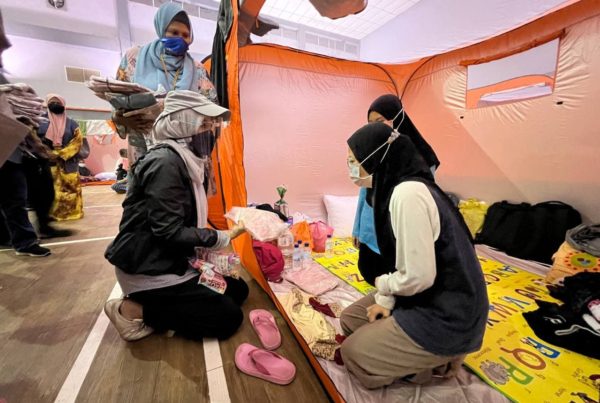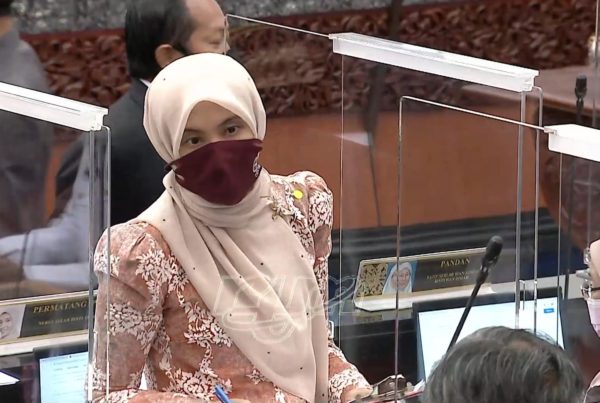Malaysiakini
Nurul Izzah Anwar, Yolanda Augustin
May 21, 10 1:51pm
n our previous article we provided a number of real life examples of how the current healthcare system and funding provisions are in many ways inadequate and failing to meet the needs of the general public.
In this subsequent article we discuss why we believe that access to healthcare is a fundamental human right and should always be based on need and not the ability to pay. We would also like to make clear our belief that healthcare must be free and equitable at the point of delivery.
We thank George Lopez for his comments on healthcare provisions under the current government system (Many now getting instant healthcare), and we appreciate that this is a complex issue to which we don’t have all the answers.  Nor are we here to merely put across a viewpoint – what we really want is to open up the debate space and get people talking about healthcare policy and implementation (particularly among the younger generation) in a positive, constructive manner that can eventually be translated into better healthcare outcomes and high quality healthcare for all Malaysians.
Nor are we here to merely put across a viewpoint – what we really want is to open up the debate space and get people talking about healthcare policy and implementation (particularly among the younger generation) in a positive, constructive manner that can eventually be translated into better healthcare outcomes and high quality healthcare for all Malaysians.
As Mr Lopez kindly pointed out – healthcare is indeed a universal right. In addition, what we need to realise is that while accessing initial consultations and diagnostic work-ups might be relatively affordable to many of us, for many Malaysians, treatment is costly.
A course of chemotherapy after early stage breast cancer is around RM12,000 in the government sector (prices start at around RM20,000 in the private sector), but the government only foots the bill if you are a public sector employee.
A triple coronary artery bypass procedure can cost up to RM40,000 and a bone marrow transplant for leukaemia around RM200,000.
What happens to those who have not served as government servants or who are not covered by private healthcare insurance?
This is what we mean by healthcare being free and equitable at the point of delivery. Hence in our humble opinion, the present system is not free, nor is it equitable.
A two tier healthcare system In Malaysia the current ruling government has promoted the development of a two-tier system – advocating the development of privatised healthcare alongside public funded and public-subsidised healthcare.
In Malaysia the current ruling government has promoted the development of a two-tier system – advocating the development of privatised healthcare alongside public funded and public-subsidised healthcare.
The general argument is often that those who can afford to pay for private healthcare should be allowed to access it, and allow the government to concentrate its limited resources on poorer members of society.
However, this current framework can result in several negative consequences. Promoting a two-tier system fragments healthcare infrastructure and delivery, undermines and weakens public health policy and encourages inequality and discrepancies in healthcare provision and outcomes. It can also result in a large proportion of citizens falling through the gaps.
A prime example of this is the American healthcare system, which up until fairly recently exposed over 50 million citizens to some of the most gross inequalities in terms of healthcare access, provision and outcomes.
America’s track record is a prime example of what can happen when healthcare is pushed off the government agenda into free market free fall.
The Obama administration’s Healthcare Reform Bill passed in March this year is fortunately starting to address some of these critical deficiencies and inequalities and should provide inspiration and momentum to a country such as Malaysia, which has a far smaller and more manageable population compared to America as well as basic infrastructure, resources and talent far beyond that of many other developing nations in Asia or Africa.
Healthcare privatisation and commercialisation
At this point it is probably important to make a distinction between private and commercial health care. In many areas of the world there are numerous examples of private services, which are run on a charitable, non-profit basis.
These organisations are crucial in filling the gap created by under funded public services.
However, what we are particularly concerned about are private hospitals based on purely free market principles aimed at maximising profit margins and making healthcare, and often, critical life and death decisions, into money making schemes.
In addition, the majority of private healthcare insurance schemes in Malaysia will not cover patients for existing healthcare conditions (which are the conditions you are most likely to need treatment for in the future) and disease relapse.
Most healthcare insurance providers will not cover people over the age of 75 (a time of life when you are most likely to need to access healthcare).
Private insurance providers also impose ceilings on provision cover (even the top end insurance policies tend not to pay out above RM250,000 within a person’s entire lifetime – a figure that is easily reached if someone suffers from a chronic condition, needs treatment for one or more serious conditions such as cancer and cardiovascular disease, or has had a solid organ or bone marrow transplant).
‘Purchasing’ cancer treatment or a coronary artery bypass graft is far more complex than buying toothpaste, a car or a house.
The doctor-patient relationship demands that trust and professional ethics remain paramount, delivering the right treatment to the right patient at the right time.
This requires a public health system that promotes evidenced based medicine, one that is abreast of new innovations and technology, promotes rigorous quality assurance and healthcare standards and regulates healthcare on behalf of patients and the general public.
These responsibilities cannot and must not be left to private sector stakeholders, whose first priority is understandably to its partners and shareholders.
At present, three parallel systems of healthcare provision exist in Malaysia.
These include the government based hospitals and health facilities, corporatized hospitals (such as Institut Jantung Negara, university teaching hospitals of Universiti Malaya, Universiti Kebangsaan Malaysia , Universiti Sains Malaysia) and a huge private sector within which the government often has stake (such as the Pantai chain of hospitals and Kumpulan Perubatan Johor).
As healthcare privatisation widens its scope, an inevitable talent and brain drain follows, as staff who are mostly underpaid and overworked in the government system migrate to the private sector.
These are also often staff who are trained at public expense – it costs an estimated RM250,000 to train one doctor at our local universities.
In 2006, Malaysia had a doctor: population ratio of 1:1214. This was half that of Singapore (1:620 in 2007), and nearly 1/10th that of Cuba (and furthermore, staff and facilities are far less equally distributed in Malaysia than in a compact city state such as Singapore).
With these issues in mind, we need to start seriously debating the current healthcare system and initiate the exploration and implementation of viable alternatives to the current status quo.
Healthcare as a fundamental human right
We believe that the public health system must be radically reformed to ensure fair and equitable healthcare that is free at the point of delivery.
As Malaysians we need to realise that the right to health is a ‘fundamental human right indispensable for the exercise of other human rights’ (Right to Highest Attainable Standards of Health 2000, UN Committee on Economic, Social and Cultural Rights).
Article 12(1) of the International Covenant on Economic, Social and Cultural Rights 1966 (ICESCR) recognises the right of everyone to “the enjoyment of the highest attainable standard of physical and mental health”.
Within this covenant, governments have specific obligations to make healthcare adequate, accessible and available to all, in particularly the marginalised and underprivileged.
Despite having been elected last week to the UN Human Rights Council, Malaysia continues to refuse to become a signatory to the ICESR.
Increasing government healthcare spending
In 2008 the Malaysian government spent a mere 4.5% of GDP on healthcare.
This was well below that of our other Asian neighbours such as Singapore (5.5%), India(8%) and China (8%) and less than WHO recommendations. Less than half of this was spent on improving and developing public health services.
 Despite this the government is hastily trying to push through plans for a nuclear energy plant with a budget allocation of at least RM20 billion (likely to be much more) that could have disastrous consequences on our health and that of future generations.
Despite this the government is hastily trying to push through plans for a nuclear energy plant with a budget allocation of at least RM20 billion (likely to be much more) that could have disastrous consequences on our health and that of future generations.
Our health is central to our general wellbeing, productivity and ability to live the lives we envisage, so why is it that we often invest so little in it?
Is it partly that those who control the health budget purse-strings are likely to never be wheeled into a government hospital as a patient and far more likely to see their own private physicians in the comfort of their private hospital suite or be whisked off to a world class health facility in Singapore, the UK or US, often at public expense?
Human nature after all dictates that we are less likely to be passionate about issues unless they have a direct impact and affect on us.
However, the issue of healthcare provision is both a political and human rights issue that none of us can afford to be apathetic or indifferent about.
Strengthening primary care and integrating health systems We need to strengthen the primary care sector and insure better integration among the primary care sector, secondary and tertiary care. We need to increase the number of trained specialists and insure that they are deployed fairly across all of Malaysia’s 13 states – avoiding a situation where pockets of excellence and super-specialisation exist in many of the larger cities but people living in Sabah or Sarawak may need to travel 4 hours by river, mud road and foot to see a doctor.
We need to strengthen the primary care sector and insure better integration among the primary care sector, secondary and tertiary care. We need to increase the number of trained specialists and insure that they are deployed fairly across all of Malaysia’s 13 states – avoiding a situation where pockets of excellence and super-specialisation exist in many of the larger cities but people living in Sabah or Sarawak may need to travel 4 hours by river, mud road and foot to see a doctor.
Prevention and health screening
We need to ask ourselves why it is that Malaysia has no comprehensive screening programme for breast cancer, cervical cancer, prostate cancer, diabetes, hypertension and chronic kidney disease to name a few? In fact, plans for cervical cancer screening were shelved by the government due to the economic downturn last year.
Screening for these illnesses so that they can be treated at an early stage, as is done in many other countries, is a proven way of saving lives, not to mention future government expenditure in treatment. So why are we not rolling out these programmes ?
Why are life-saving treatments such as angioplasty and coronary bypass surgery for coronary artery disease not widely available throughout Malaysia, but rather concentrated in a few centres of excellence only?
Why is your chance of surviving a heart attack determined by the postcode lottery of where in Malaysia you live?
If you are within half an hour of Institute Jantung Negara or Pusat Perubatan Universiti Malaya you probably stand a very good chance of being alive 3 months later to tell the tale. If you happen to be living in Jerantut or Sibu you might not be quite so lucky.
Postgraduate medical training
We need to ensure a structured, well supported training programme for all medical graduates who wish to specialise and work in Malaysia, in order to prevent losing them to the brain drain of training programmes abroad in Singapore, Australia and the UK.
At present, junior doctors can spend years in limbo, waiting for a training post to become available in the speciality of their choice, leaving our doctors severely demoralised and intent on leaving for training abroad.
Others are posted to rural areas at an early stage in their training, leaving them ill equipped, poorly supervised and inadequately supported at a critical stage in their professional development.
Medical staff need to be paid a fair and competitive wage that reflects their level of training, skills and experience.
Promotions and career advancement must be fair, transparent and based on merit. A stimulating, dynamic environment where staff are highly valued and continued professional development promoted can lead to a higher level of staff satisfaction and retention within the government sector, and ultimately better patient care and healthcare outcomes for all of us.
Holding the government accountable
As Malaysians we don’t suffer from a lack of talent, innovation or even resources. What we do tend to suffer from though is a lack of political will and a sense of apathy when it comes to policy issues that really matter.
Civil society needs to be more proactive in holding our elected politicians and public servants accountable to their responsibilities towards the rakyat they are meant to serve.
In a constantly changing and transient world, the words of Benjamin Franklin remind us that ‘in the world nothing is certain except death and taxes’. Each and every one of us will at some time in our lives need to enlist the help of a physician.
We believe that the right to safe, equitable and compassionate healthcare is a fundamental human right, as fundamental as basic human rights to food, shelter, safety and education. We should not, and in fact must not, rely on market forces to determine whether or not this crucial obligation is adequately and robustly met.
Nurul Izzah Anwar is a Member of Parliment for Lembah Pantai
Yolanda Augustin is a Malaysian doctor training in the UK



